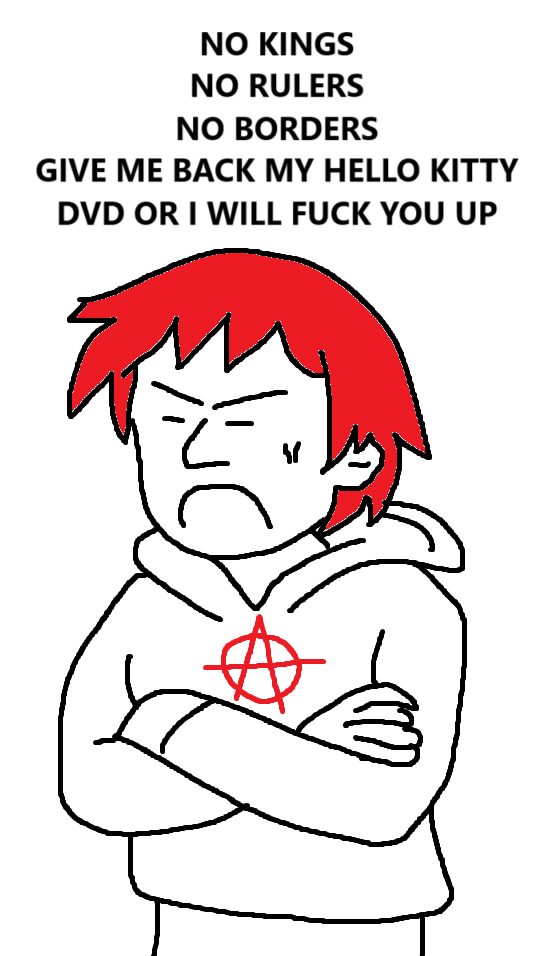[dude with glasses in a communist t-shirt, arguing] I’m the only leftist here, your opinions are TRASH
[dude holding a theory book on smug, arguing] Read theory you losers, you’re all WRONG
[dude in an anarchist hoodie, arguing] Nuh-uh, I’m the only leftist here, you’re SHITLIBS
[the three dudes are now caught in a cartoon fight, glasses gone flying, punches everywhere, while a firing squad of nazis are targeting them with rifles]
[a confused nazi asks] Why… why are they still arguing?



ok this gotta be my last response bc i got better shit to do today.
so first off, i simply dont care what the marxist definition or critique of something is, so yes, please understand it as just the general anarchist critique.
well yes, if they want to stay a delegate they have to comply with the mandate they were given. i also understand that there may be practical considerations that lead ppl to choose weak (e.g. 95%) consensus decisions, and u can call that hierarchical if u like, but that doesnt mean we shouldnt strive to abolish all hierarchies.
the way u have described the PRC does not sound like they have delegates, rather representatives. ive already explained the difference.
as for considering the PRC state capitalist, this is my conception (altho i know a few marxists who agree), and so far ive only argued about the ownership situation and not touched upon wealth accumulation or markets at all, but i think ive still made a fair argument.
Well, up front, it’s nice that you at least cleared up that you don’t consider Marxism to be socialist. I disagree with that, of course, but now that we’ve established that your definition of socialism is exclusionary of Marxism, then that does at least mean we can have a consistent conversation.
As for delegates vs. representatives, the PRC’s democracy extends beyond simply voting for candidates and representatives. I already explained that each rung makes decisions for that which their area needs, and elect from among themselves delegates that they can recall. People’s integration into politics isn’t relegated to simple elections, but consensus building, feedback, drafts of policy, etc.
As for ownership, your argument was that politicians are literally owners of publicly owned industry, which isn’t how public ownership works anywhere. Even if the PRC is centrally planned for the majority of its large firms and key industries, that doesn’t mean those large firms and key industries are run for profit, personal enrichment of capitalists, participate in markets, etc. There’s nothing at all resembling capitalism there, so state capitalism is an absurdity. I gave clear examples of capitalist systems with heavy state involvement, like Singapore, that better fit “state capitalism.”
Either way, this will be my last comment too. Have a good one!
https://www.youtube.com/watch?v=Zc2q-82G6dg
Again, I’m aware of the anarchist critique, I used to be an anarchist myself, I just firmly disagree with it.
yes, well, if u had watched it, u wouldve noticed its not about the anarchist critique.
I did watch it, just posting a 4 minute video from an anarchist YouTuber doesn’t mean I immediately need to agree with it. Anark coats it as a Marxist critique, but it’s thoroughly an anarchist critique attempting to claim higher and universal legitimacy by invoking Marx and Engels, but what Marx and Engels described as state capitalism was Bismarck’s Germany, which had the large firms and key industries absolutely privately owned with minor exceptions like railways.
The state in Bismarck’s Germany played a hand in directing the private economy, while retaining class relations. It wasn’t because they had a state, it’s because the base of production was capitalism, subject to the M-C…P…C’-M’ circuit. Anark’s critique is ignorant at best to dishonest at worst. Here’s Engels directly speaking about it:
Instead, what needs to happen is proletarian revolution, and gradual appropriation of property into the hands of the new, proletarian state, until all property is collectivized and the proletarian state is no more:
So yes, I did watch it. It’s one of those videos that only really makes sense to people that haven’t put in the time to take Marxism seriously, and just want to quotegrab Marx and Engels to give their points higher legitimacy. Even Anark’s examples of Chile and Yugoslavia were more market-focused and less collectivized, Yugoslavia in particular relied on IMF loans to keep going. Anark’s mislabling of socialism as intrinsically worker-ownership and not collectivized ownership pretty much leaves only anarchism and anarchist adjacent ideologies as socialist. And, the USSR and PRC, Cuba, etc. do have worker democracy:
I’m sorry I took your video seriously, I guess? I dunno, were you just wanting me to concede the point outright?
im sorry to hear that after all of this u continue to claim the state is an extension of its people, and continue to mix representation and delegation. or for that matter, the myth of the state abolishing itself, which has no basis in reality.
ill give up on explaining this to u now. just one small thing: its spelled Bismarck, not Bismark.
Yes, after all of this I hold to the Marxist understanding, you haven’t offered any compelling reason to abandon it, and have, to the contrary, shown a poor understanding of Marxism on both your’s and Anark’s parts. I’ll correct a few of your misclaims about my stance here, though, for any popping in afterwards:
The state is an extension not of its people. The state is an extension of the ruling class, and the ruling class is determined by the base mode of production. A bourgeois state is one where private property is the base mode of production, and a proletarian state is one in which collectivized ownership is the base mode of production. As all property gets collectivized, class disappears, and so too does the need to oppress other classes, as everyone has equal ownership, leaving only instruments like social planning, administration, management, etc in place. That’s the economic and historical basis of the elimination of the state.
As for delegates vs representatives, I understand the difference you claim they have, I just don’t hold them as foundationally different to the point that one or the other invalidates the entire social basis of production.
Thanks for the Birmarck correction. Doesn’t invalidate my points, but I’ll make the correction regardless. If you have more questions, I’ll be more than happy to answer.
I’ve never seen such unjustified condescension, my god.